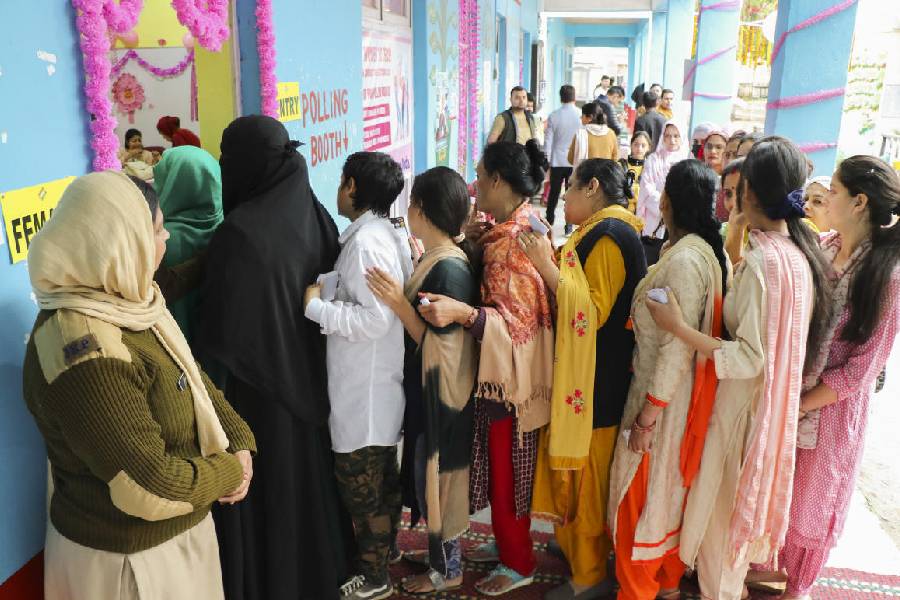The residents of Dhadkahi, known as the "silent village" in Jammu and Kashmir's Doda district due to its large deaf-and-dumb population, exercised their right to vote in the Lok Sabha polls on Friday in the hope of getting basic amenities, such as roads, water, healthcare facilities and education.
However, they warned of boycotting future elections if their demands are not met.
Located amidst snow-clad mountains, Dhadkahi is primarily inhabited by members of the Gujjar community, known for their agricultural practices and nomadic lifestyle. The unique characteristic of the village is that more than half of its population has faced challenges in hearing and speaking due to congenital medical conditions since 1950.
Despite these challenges, more than 35 per cent of the eligible voters in the village cast their votes at two polling booths by the afternoon.
"We have voted to garner support for our long-standing demand for basic facilities. We urge the government to set up schools for the deaf-and-mute children in our village," Mohammad Hanief, a social activist, said.
The villagers emphasised the need for immediate attention to their issues, including teachers for a primary school, a doctor for a primary health centre and linking the hamlet with the road network.
"The administration should look into the villagers' problems and ensure that the primary school gets teachers, the primary health centre gets a doctor and the village is linked to the road network," Hanief said.
The villagers said they will boycott future elections if their demands are not addressed promptly.
"We will boycott any election -- whether for the Assembly or panchayats -- if our demands are not met," Hanief said.
With the help of Hanief, Rahil Ali, a deaf-and-mute father of five kids, stressed the importance of a school for children with similar conditions.
"We cast our votes with this demand in mind. The government should ensure the establishment of a deaf-and-dumb school to educate these children," he said in sign language, which was interpreted by Hanief.
The villagers also called for government support to help the deaf-and-mute youngsters become self-reliant by starting their own businesses.
"The government should provide them with loans, training and animals under various schemes to help them earn a livelihood," Hanief said.
Despite their hearing-and-speech impairments, the villagers were enthusiastic about participating in the polling process.
"We are very happy to take part in the polling to choose our MP. Everyone is enthusiastic that the new MP will provide justice to us by ensuring basic facilities," Shabir Ahmed said.
Dhadkahi is home to approximately 4,500 Gujjars. The first case of hearing-and-speech impairment was reported in the village in 1939.
The village is part of the Udhampur Lok Sabha constituency, one of the 102 seats in the country that went to polls on Friday.
More than 57.09 per cent voters of Udhampur exercised their franchise by 3 pm despite torrential rains, election officials said.
The polling began at 7 am at 2,637 polling stations across the constituency, with more than 16.23 lakh voters eligible to cast their votes. No untoward incident was reported from anywhere, the officials said.
Twelve candidates, including Union minister Jitendra Singh of the ruling Bharatiya Janata Party (BJP), former MP Choudhary Lal Singh of the Congress and former minister G M Saroori of the Democratic Progressive Azad Party (DPAP), are in the fray from Udhampur.
While Jitendra Singh is eyeing a third straight term in the Lok Sabha, Choudhary Lal Singh, who won the seat in 2004 and 2009, is also trying his luck for a third victory.
This is the first major electoral battle in Jammu and Kashmir after the abrogation of the provisions of Article 370 of the Constitution and the erstwhile state's bifurcation into Union territories on August 5, 2019.
More than 11,000 polling staff, including reserves, have been deployed to ensure a free-and-fair election, the officials said.
According to the office of the chief electoral officer, 1,472 of the 2,637 polling stations have been equipped with webcasting facilities in the constituency that has 16,23,195 voters.
Among the voters, 8,45,283 are men, 7,77,899 are women and 13 are third-gender voters. Of the 2,637 polling stations, 2,457 are in rural areas and 180 in urban areas.
The highest number of 701 polling stations are in Kathua, 654 in Udhampur, 529 in Doda, 405 in Kishtwar and 348 in Ramban.
Udhampur consists of 18 Assembly segments spanning five districts -- Kishtwar, Doda, Ramban, Udhampur and Kathua.
Except for the headline, this story has not been edited by The Telegraph Online staff and has been published from a syndicated feed.











